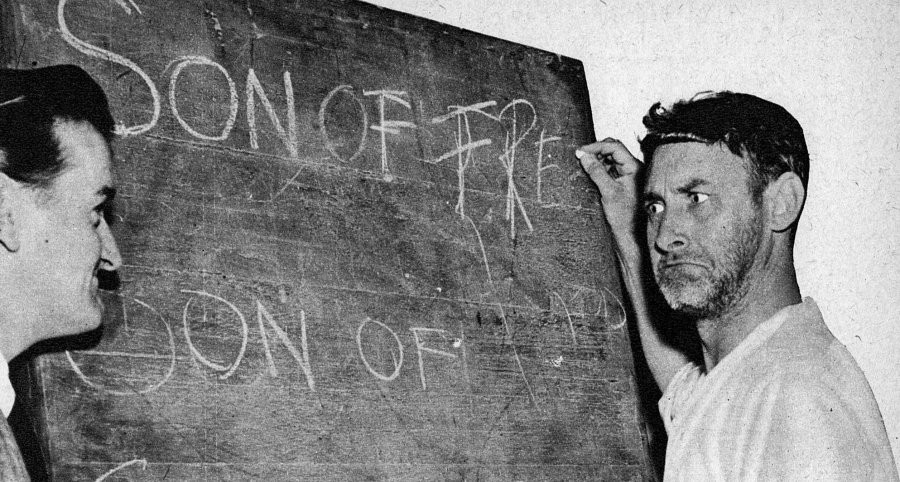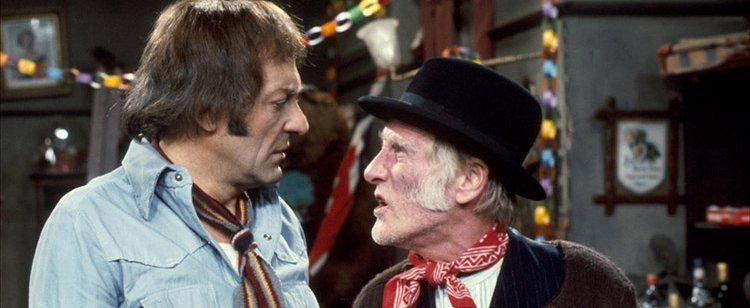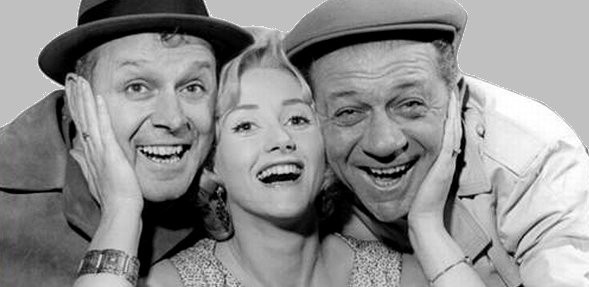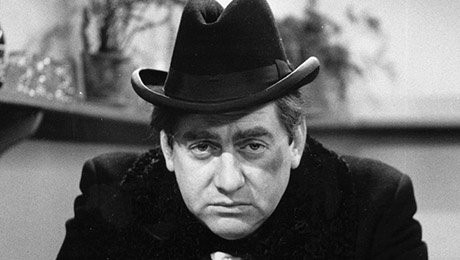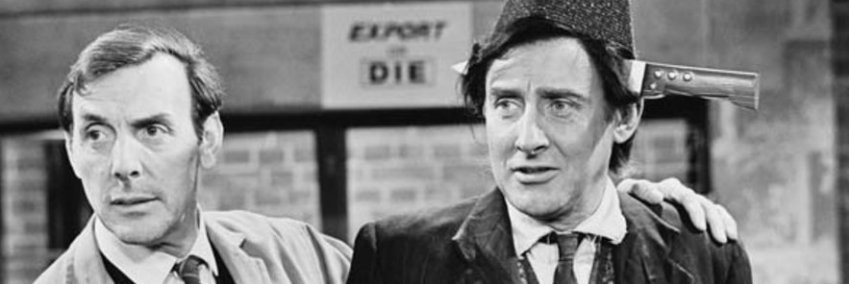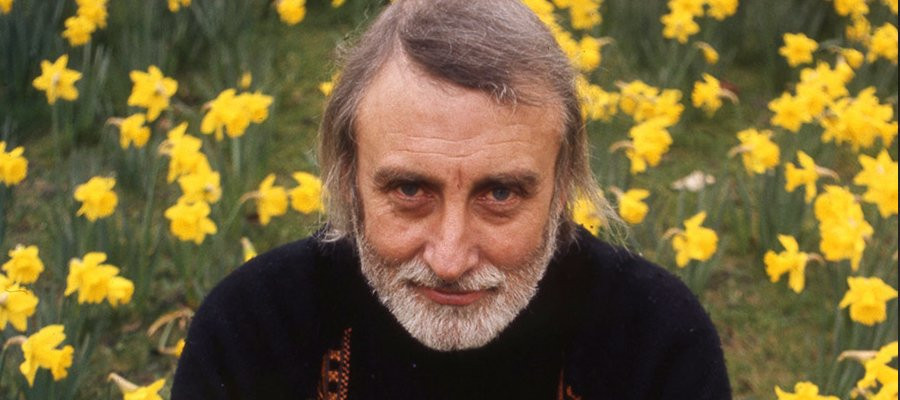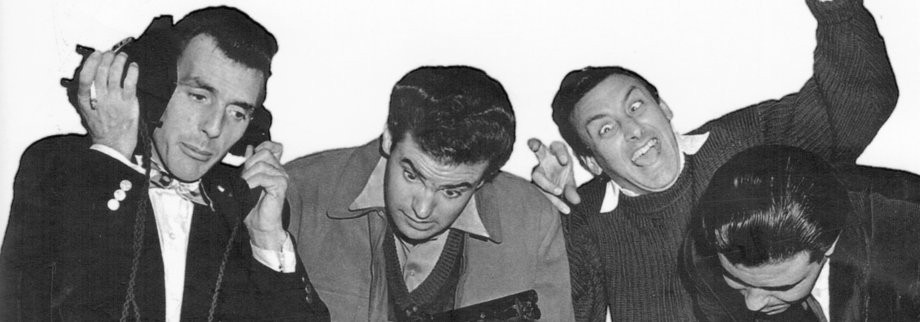
The House of Fun
The house of fun really did exist. It was the home of a quite unique writers’ co-operative called Associated London Scripts – based in west London half-way up the Uxbridge Road on Shepherd’s Bush Green – and, to begin with, it contained the following quartet of unparalleled comedy talents: Eric Sykes, Spike Milligan, Ray Galton and Alan Simpson. Packing those four together was like squeezing Plato, Galileo, Newton and Einstein into the same scruffy Ealing bed-sit, only with better sound effects and slightly fewer fights.
This was one centre that really held: all kinds of wild, wise and wonderful comedy ideas – about sitcoms, about satire, about sketches and about love and death and life – flew out of every window and reached into every soul. The future of post-war British humour started to materialise in the combined out-trays of Spike, Eric, Ray and Alan.
As if providing a safe haven for this stellar comic quartet was not impressive enough, the building itself would also come to serve as a home-from-home, meeting place, rumpus room and/or occasional labour exchange to a truly extraordinary crowd of up-and-coming writers – including Johnny Speight, John Antrobus, Terry Nation, Dick Vosburgh, Eric Merriman, Dave Freeman, Barry Took and Marty Feldman. The scripts that went out of that house would help further the comedy careers of Frankie Howerd, Tony Hancock, Tommy Cooper, Peter Sellers, Arthur Haynes, Arthur Askey, Warren Mitchell, Dick Emery, Benny Hill, Bill Fraser, Harry Worth, June Whitfield, Kenneth Williams, Sid James, Ted Ray, Joan Sims, Charlie Drake, Clive Dunn, Terry Scott, Harry H. Corbett, Bruce Forsyth, Ronnie Barker, Hattie Jacques and Morecambe and Wise – to name but a few.
They also helped shape and sustain such major series on radio and television as ‘The Goon Show,’ ‘Educating Archie,’ ‘Hancock’s Half-Hour,’ ‘Beyond Our Ken,’ ‘Sykes And A…,’ ‘Round the Horne,’ ‘Steptoe and Son,’ ‘Comedy Playhouse,’ ‘The Army Game,’ ‘Bootsie and Snudge,’ ‘That Was The Week That Was,’ and ‘Till Death Us Do Part’ (as well as generate such stage plays as ‘Son of Oblomov,’ and ‘The Bed-sitting Room’ and such movies as ‘The Rebel,’ ‘The Wrong Arm of the Law,’ ‘The Spy with a Cold Nose,’ and ‘The Plank’). In addition to all of this, the house gave birth to the Daleks for ‘Doctor Who.’
The influence of ALS, as the collective came to be known, would prove to be profound, and much of what was good and real and interesting about the popular culture that followed can probably be traced to that address. The Beatles, for instance, grew up being inspired by The Goons as well as by Elvis Presley. Looking back from the mid-1970s, John Lennon would recall for readers of the New York Times how much he and the others benefited from having an ‘honorary Goon’, George Martin, as their producer, and how the band’s studio sessions were full of cries of Neddie Seagoon, etc., etc., as were most places in Britain’:
It was also thanks in part to ALS that, at the start of the 1970s, prime-time American television suddenly started to grow up, because ‘All in the Family’ – the first sitcom on that side of the Atlantic that dared to take on the censors – was adapted from ‘Till Death Us Do Part.’ Sixty million people tuned in each week to find they were now characters on US network television who sometimes fell ill, often resorted to bad language, knew all about sex, argued about politics, race and religion (and sex), and even used the lavatory. Everything that followed, right up to the arrival of Larry David’s admirably audacious ‘Curb Your Enthusiasm’ at the start of the next millennium, would benefit from the kind of realism, bravery and common sense that ‘All in the Family’ first imported from ALS.
Other countries benefited, too. Thanks to ALS’s pioneering marketing of its writers’ own formats, scripts and ideas, numerous communities outside of Britain and America – including Holland, Germany, Norway, Sweden and Portugal – would find a prominent place on their screens for a relationship like that of the Steptoes or a character like Anthony Hancock. Membership of the house of fun became the best kind of calling card to offer the entertainment world: ALS? That will do nicely. Class was recognised, and quality travelled.
The influence has gone on and on. Comedians as richly different in type and tone as Robin Williams, Ricky Gervais, Mike Myers, Steve Martin and Eddie Izzard; sitcoms as diverse as ‘Fawlty Towers,’ ‘Frasier,’ ‘Father Ted,’ ‘The Office,’ ‘I’m Alan Partridge,’ ‘Only Fools and Horses,’ ‘The Young Ones’ and ‘The League of Gentlemen'; sketch-based and various other forms of ‘broken comedy’ shows including ‘Monty Python’s Flying Circus,’ ‘Not the Nine O’Clock News,’ ‘The Fast Show’ and ‘Little Britain’; satirical news and current affairs programmes such as ‘Spitting Image,’ ‘The Day Today,’ ‘Brass Eye’ and ‘Have I Got News for You’; and surreal little sagas like ‘The Hitchhiker’s Guide to the Galaxy’; they would all owe some kind of debt, whether they were aware of it or not, to the extraordinary legacy of ALS, and its comedy thread runs on all the way through to the current day.
This is why the original writers’ collective deserves so thoroughly to be remembered, respected and celebrated. It only existed officially for about twelve years, but, while it lasted, it was always one house in Britain that was committed to creating that most elusive but precious of commodities: pure unadulterated fun.
Graham McCann - adapted from 'Spike and Co.' with the author's permission.
In his book ‘Spike and Co.’ the UK’s most admired entertainment writer, Graham McCann, takes us on an enthralling journey inside the house of fun, moving from the bright optimism of the early 1950s, to the comedies and crises of the 1960s. The book pieces together the story of ALS and recounts the richly colourful incidents that went on within its hollowed walls. It doesn’t just give the biographies of some of the countries all-time favourite scriptwriters but also tells how such comedy classics as ‘The Goon Show’, ‘Hancock’, ‘Steptoe and Son’ and ‘Till Death Us Do Part’ (to name but a few) came about, and the massive influence each one had on the world of situation comedy. For anyone interested in the history of British entertainment and how its influence has spread throughout the world – this is an essential read.
Other books from Graham McCann
Published on February 26th, 2019. Written by Graham McCann - adapted from 'Spike and Co.' with the author's permission for Television Heaven.


